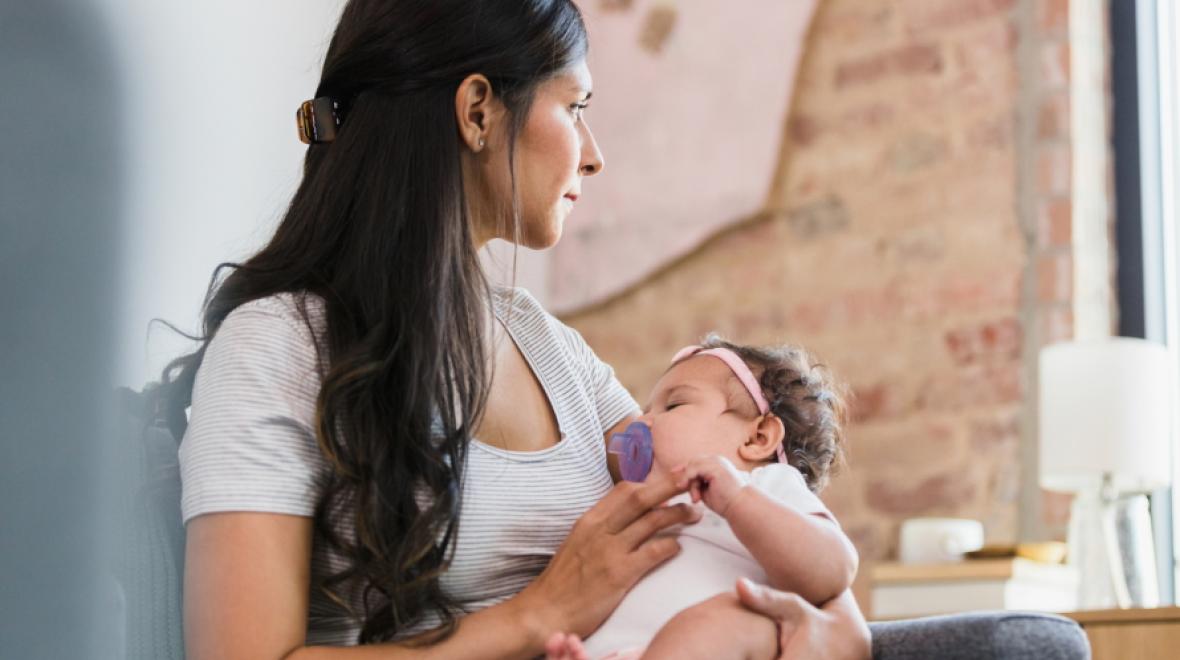
According to Postpartum Depression, nearly 50 percent of mothers who will experience postpartum depression will not be diagnosed by a health provider.
Studies in both the United States and the United Kingdom have found that as many as 1 in 10 new mothers will experience postpartum depression symptoms, with some studies saying that number is as high as 1 in 7. Postpartum anxiety rates were even higher, and it is estimated that roughly 30 percent of those diagnosed with PPD or PPA had a co-occurring mental health condition.
These results only account for live births … many mothers who experience miscarriage, stillbirth or even opt to have an abortion will experience postpartum depression as well.
April’s story
Mother and counselor April shares, “I wish it was talked about more than it is … I wish someone had told me that it was normal and that I wasn’t alone.”
She shared more of her experience:
I had my first daughter and her birth was really traumatic. When she was about 2 months old, I went to the doctor and he told me I had postpartum depression. I felt like I was being electrocuted from the inside out, I wasn’t sleeping, I didn’t feel connected to my baby and I was still having severe pain because of her birth. Unfortunately, at the time I was in a really toxic church, and my church was not supportive of me being on medication and told me I just needed to pray. I did take medication but I felt guilty about it.
Two years later, I had my second daughter. The pregnancy was hard but the birth was perfect, so recovery was much easier. Since I’d had PPD before, my doctor started me on an antidepressant immediately. I didn’t have the bad symptoms before, but also started having really bad anxiety. I was having panic attacks several times a day, and I would have intrusive thoughts imagining awful things happening to my kids; I was terrified they would get hurt, and eventually, I could barely leave my house. For the year after her birth, I caught everything that came around, I was sick constantly. But I also had lots of symptoms that didn’t match up with the viruses and stuff.
A year after her birth, I was at another doctor’s appointment. He came in the room, sat down, and told me I had chronic depression and generalized anxiety disorder. So, I went back on medication. I was still in that type of religious environment, so I still felt guilty and went off them again. That was in 2013. As of 2020, I’m back on meds and feeling great. I now know that’s my brain’s default and I need the help. My psychiatrist says that’s why my PPD AND PPA was so bad.
Symptoms of postpartum depression and anxiety:
- Feeling sad, worthless or hopeless
- Worrying excessively or feeling on edge
- Loss of interest in activities or hobbies once enjoyed
- Changes in appetite
- Loss of energy and motivation
- Having trouble sleeping
- Feeling more emotional than usual
- Difficulty connecting with the baby or loved ones
What to do:
If you think that you or a loved one has postpartum depression or anxiety, there is hope.
An estimated 80 percent of women treated for postpartum depression make a full recovery. The key lies in getting help. That can look different for each person. Maybe you are comfortable seeing a doctor who can help you find the right balance between medication and/or counseling. Maybe you will lean on your social supports, either in the form of connecting in person or attending a virtual support group.
Whatever your preferences are, the important thing to remember is that you are not alone. There are people out there ready to help you. All you have to do is reach out and open yourself up to them.
Additional resources:
If you found this article helpful, check out these additional resources on postpartum depression and anxiety.
- Postpartum statistics on the Postpartum Depression website
- 4 Ways to Cope With Postpartum Depression
- Treating Postpartum Depression (Mayo Clinic)
Editor's note: This article was originally published on the Lily-Jo Project blog and is reprinted here with permission.











